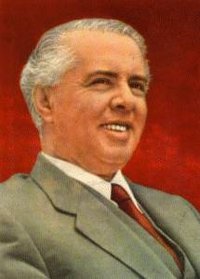Enver Hoxha
|
|
Enver Hoxha, (IPA , October 16, 1908–April 11, 1985) was the leader of Albania from the end of World War II until his death in 1985, as the First Secretary of the Communist Albanian Party of Labour. He was also Prime Minister of Albania from 1944 to 1954 and the Minister of Foreign Affairs from 1946 to 1953. Under Hoxha, whose rule was characterized by isolation from the rest of Europe and firm adherence to Stalinism, Albania emerged from semi-feudalism to become an industrialized state.
Biography
Hoxha was born in Gjirokastër, a city in southern Albania. He was the son of a Muslim cloth merchant who travelled widely across Europe during his childhood, and the major influence on Enver during these years was his uncle, Hyen Hoxha (). Hyen Hoxha was a militant socialist who campaigned vigourously for the independence of Albania - which occurred when Enver was four years old - and opposed the repressive governments that prevailed after independence. Enver took to these ideas very strongly, especially after King Zog came to power in 1928.
In 1930, he went to study at the University of Montpellier in France on a state scholarship, but he soon dropped out. From 1934 to 1936 he was a secretary at the Albanian consulate in Brussels. He also studied law at the university there. He returned to Albania in 1936 and became a teacher in Korçë.
Hoxha was dismissed from his teaching post following the 1939 Italian invasion of World War II for refusing to join the Albanian Fascist Party. He opened a tobacco shop in Tiranë where soon a small communist group started gathering. He was helped by Yugoslav communists to found and become leader of the Albanian Communist Party (called Party of Labour afterwards) in November 1941, as well as the resistance movement (National Liberation Army), which took power in November 1944.
Hoxha declared himself an orthodox Marxist-Leninist and strongly admired Joseph Stalin. He adopted the model of the Soviet Union and severed relations with his former Yugoslav communist allies following their ideological breach with Moscow in 1948. He had defence minister Koçi Xoxe () executed a year later for alleged pro-Yugoslav activities.
Albania_bunkers.jpg
Hoxha confiscated farmland from wealthy landowners and consolidated it into collective farms (Cooperatives) that eventually enabled Albania to become almost completely self-sufficient in food crops. He also developed the industry and brought electricity to most rural areas, and epidemics of disease and illiteracy were stamped out. Worried about an invasion from the Soviet bloc, Italy or the United States, from 1950 Hoxha authorised the construction of thousands of one-man concrete bunkers across the country, to act as look outs and gun emplacements, possibly numbering in excess of 500,000.
Hoxha remained a firm Stalinist despite new Soviet leader Nikita Khrushchev's repudiation of Stalin's excesses in 1956 at the Twentieth Party Congress of the Soviet Communist Party, but this meant Albania's isolation from the rest of communist Eastern Europe. In 1960, Hoxha aligned Albania with the People's Republic of China in the Sino-Soviet split, severing relations with Moscow the following year. In 1968, Albania withdrew from the Warsaw Pact in response to the Soviet-led invasion of Czechoslovakia.
In 1967, following two decades of progressively harsher persecution of religion under his rule, Hoxha triumphantly declared his nation to be the first atheist state in history. Partially inspired by China's Cultural Revolution, he proceeded to confiscate mosques, churches, monasteries, and shrines. Many were immediately razed, others turned into machine shops, warehouses, stables, and movie theaters. Parents were forbidden to give their children religious names. Anyone caught with the Qur'an, Bibles, icons, or religious objects faced long prison sentences. In the south, where the ethnic Greek population was concentrated, villages named after saints were given secular names.
According to a landmark Amnesty International report published in 1984 Albania's human rights record was dismal under Hoxha. The regime denied its citizens freedom of expression, religion, movement, and association although the constitution of 1976 ostensibly guaranteed each of these rights. In fact, certain clauses in the constitution effectively circumscribed the exercise of political liberties that the regime interpreted as contrary to the established order. In addition, the regime tried to deny the population access to information other than that disseminated by the government-controlled media. The Sigurimi routinely violated the privacy of persons, homes, and communications and made arbitrary arrests. The courts ensured that verdicts were rendered from the party's political perspective rather than affording due process to the accused, who were occasionally sentenced without even the formality of a trial.
Mao's death in 1976 and the defeat of the Gang of Four in China's subsequent inner-party struggle in 1977 and 1978 led to the Sino-Albanian split and Albania's retreat into political isolation, with Hoxha claiming the anti-revisionist mantle to criticize both Moscow and Beijing.
In 1981, Hoxha ordered the execution of several party and government officials in a purge. Prime Minister Mehmet Shehu was reported to have committed suicide following a further dispute within the Albanian leadership in December 1981, but is often believed to have been killed.
Later, Hoxha withdrew into semiretirement and turned most state functions over to Ramiz Alia. Hoxha's death on April 11, 1985 led to some relaxation in internal and foreign policies under his successor Ramiz Alia, as communist party rule weakened throughout Eastern Europe, culminating in Albania's abandonment of one-party rule in 1990 and the reformed Socialist Party's defeat in the 1992 elections.
See also
External links
- Enver Hoxha tungjatjeta (http://www.enverhoxha.info/frame.htm)
- Enver Hoxha Reference Archive at marxists.org (http://www.marxists.org/reference/archive/hoxha/index.htm)
- Comrade Loulou and the Fun Factory - A highly negative and satirical view of Hoxha (http://www.diacritica.com/degenerate/5/enver.html)
- Albanian.com article on Hoxha (http://www.albanian.com/main/history/hoxha.html)
| Preceded by: King Victor Emmanuel III (de jure) | Leaders of Albania | Succeeded by Ramiz Alia |
et:Enver Hoxha fr:Enver Hoxha nl:Enver Hoxha ja:エンヴェル・ホッジャ no:Enver Hoxha pl:Enver Hodża pt:Enver Hoxha sv:Enver Hoxha

